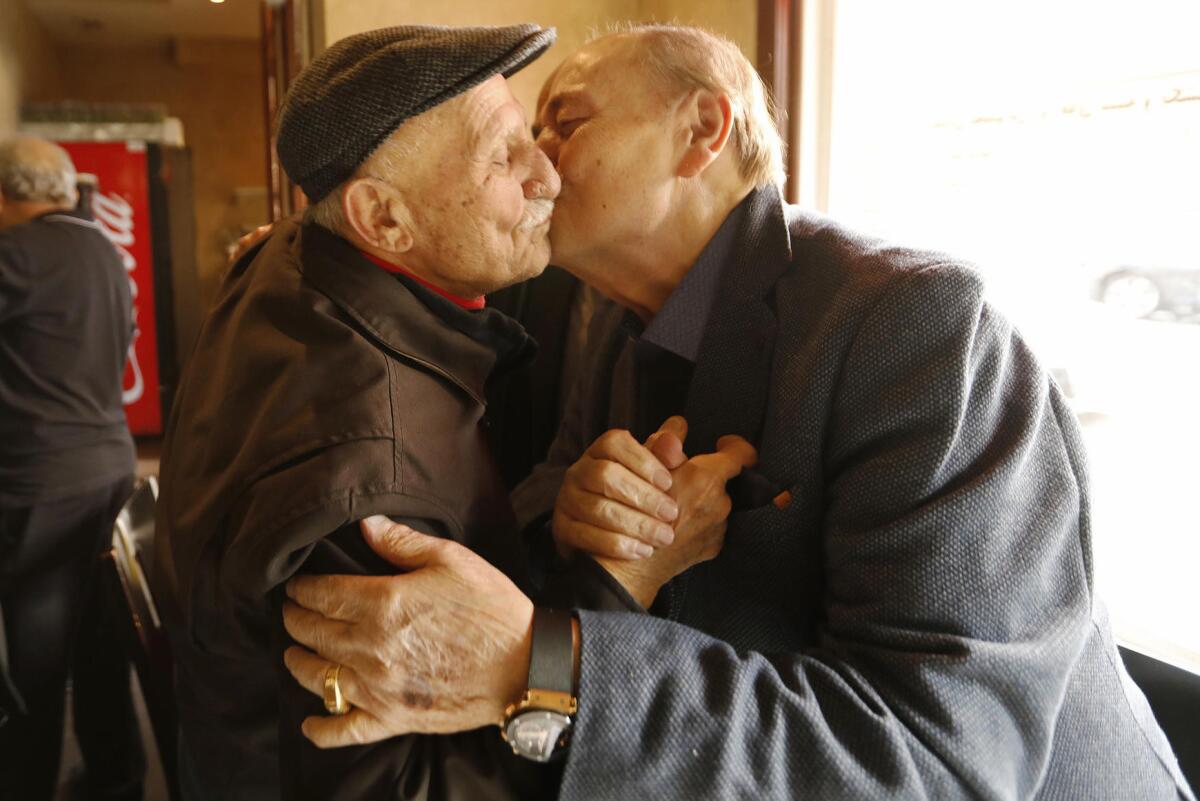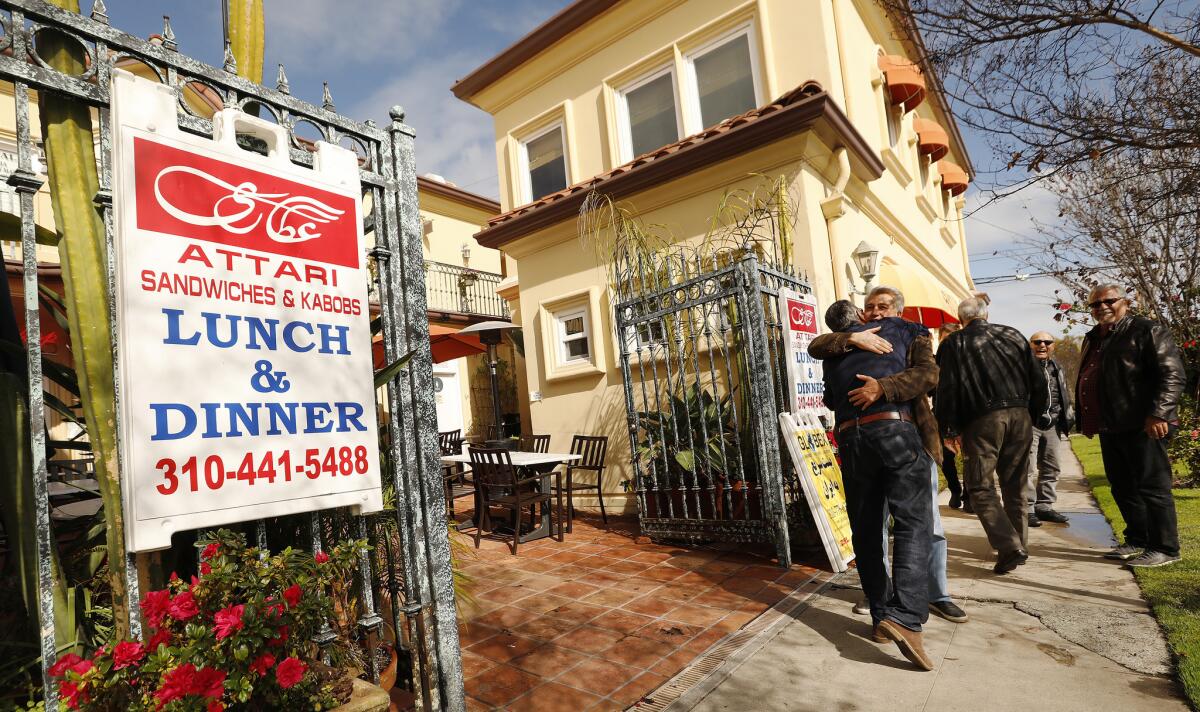Column One: The revolution drove them from home and showbiz. In L.A.’s ‘Tehrangeles,’ they can relive a lost era

The old man took out his iPhone and scrolled to a black-and-white photo taken 50 years ago on a movie set in Tehran. Mansour Sepehrnia is paunchy and gray now, but then he was slender and his hair jet black. Along with two other men in the photo, he’s wearing a tuxedo.
They were filming a comedy and the trio evoked Three Stooges slapstick: Sepehrnia and another skinny actor held up a chunky guy with a goofy expression on his face as he struggled to stand.
Sepehrnia shared the image with his fellow diners, then turned to his right and looked at his old friend Shomayoun Tabrizian. He was the other skinny guy. “Remember this photo?” Sepehrnia asked.
Tabrizian nodded. Smiles all around at the memory.
Memories fuel the conversation when Sepehrnia, 89, and other old friends gather each week at the Attari Sandwich Shop in “Tehrangeles,” the Persian community in Westwood that blossomed after the Islamic Revolution of 1979 prompted thousands of Iranians to flee to the United States. It’s not unusual to find old men gathered like this in other restaurants and tea shops in Tehrangeles. But you’re more likely to see them play backgammon or grumble about the state of Iran today.
At the Attari, the topic is Hollywood — at least the Iranian version of it — and the memories come from a regular group of former actors, comedians, film editors and theater owners who were part of Iran’s once-robust entertainment industry. They had to give up show business when they came to L.A. For 26 years, this little group has gathered at the restaurant every Tuesday at 11 a.m.
The number of diners, all men, varies — sometimes a few, sometimes about 10. They mostly speak Persian but sometimes throw in the occasional English. Although each left Iran at a different time and while some still travel to the Islamic Republic, their days in the industry are now distant memories. Sometimes the men sit together without exchanging a single word, simply happy to be in one another’s presence.
The gathering brings to mind the famed roundtable at the Hillcrest Country Club in Los Angeles, where comedians such as George Burns, Groucho Marx and George Jessel cracked jokes and reminisced. At the Attari, the ambience is less glitzy and conversation less competitive — no one is trying to outdo one another — and the wisecracks don’t flow in English.
Just as Sepehrnia finished showing his friends the old photo, he recalled trying to film a fight scene. “The director was trying to show this guy how to fake-punch me, and he didn’t know how to do it,” he said.
Sepehrnia speaks in a slow, methodological way and continued as the waiter dropped off tea.
“Next thing I know the guy swings his arm and hits my nose! I had blood everywhere. And I see the director is laughing so hard he has tears coming down his face,” Sepehrnia recalled, laughing. “The director said now I am a real comedian.”
That’s when Reza Taghavi, 79, jumped in, directing the men back to the tuxedo photo.
“You guys were much better looking back then!” he joked.
The room echoed with more deep laughter.
Another of the regulars, John Reghabi, recalled how in Iran fans always recognized him. Reghabi doesn’t say this in a boastful way. He was a leading man and, as his friends see it, just stating the facts.
“I was a famous guy,” said Reghabi, 81. “I couldn’t walk down the street without being stopped.”
His friends nodded.
“Yes, everyone knew you!” said Taghavi, who used to handle movie advertising. “You were famous.”
But Reghabi’s fortunes, and those of everyone else who gather each Tuesday at 11, changed 40 years ago last week. On Feb. 11, 1979, the revolution that would overthrew Shah Mohammed Reza Pahlavi began.
Like many other older first-generation Iranian Americans, the men now feel stranded, stuck between their memories of an Iran that no longer exists and the American identities they have come to embrace. But they still have their memories of the movies.
Iran’s film industry started to grow rapidly in the 1950s. Studios were launched and produced hundreds of films while movie theaters popped up in Tehran and the provinces.
In the last two decades before the revolution, the country’s cinema underwent a transformation. The “Iranian New Wave,” as it was known, used simple dialogue and camera work to portray the plight of the lower class and to critique sociopolitical conditions. Such films sought to compete with Hollywood-inspired films that were ubiquitous. Pahlavi censored or banned several New Wave films that he believed critiqued his efforts of “Westerninizing” Iran.
Sepehrnia’s specialty was comedy, and he acted in more than 100 movies. He’s most proud of a 1971 film, “A Suitcaseful of Sex,” in which he plays a thief who steals a suitcase only to find a young woman hiding in it. Given the plot, and especially the title, it wasn’t the kind of movie that would win over religious authorities after the revolution.
Sepehrnia happened to be in Los Angeles visiting two friends when the revolution began. Sepehrnia’s father called and told him not to return. There was no point, his father said.
His four children eventually joined him when he settled in Glendale, but his wife stayed behind in Iran. Sepehrnia become an entrepreneur, buying three gas stations, because he wasn’t able to continue acting.
“If I didn’t have an accent, I could have continued to be a comedian in America,” he said.
Sepehrnia spoke at a table laden with cups of steaming tea, honey-soaked baklava and pieces of bamieh, fried dough infused with rose water and saffron. As a waitress dashed by with a bowl filled to the brim, Sepehrnia caught a whiff of the barley soup. He’s hard of hearing and yelled out to the waitress.
“I want one of those!” he said in English.
“You have it!” Taghavi said in Persian. “It’s right next to you.”
The men again burst out laughing, and when Sepehrnia saw he already had a bowl, he laughed too.
“That’s what happens when you get old,” he said as he dipped his spoon into the soup.
Laughter is the predominant sound at the lunches, but it fades away as the men recall careers, and people, they have lost. Sepehrnia and Tabrizian sadly noted that the third man in the tuxedo photo — the one making the goofy face — had died.
Tabrizian still lives in Iran and was a rare visitor to the Tuesday lunch. Taghavi reflected on friends back in Iran who haven’t been able to receive visas to visit the United States under the Trump administration’s travel ban.
“We used to have so many people visit,” he said. “Now barely anyone comes.”
Taghavi left Iran five months after the revolution, with his wife, 7-year-old son, 4-year-old daughter and $21,600. He had planned to stay for only three or four months. He would have brought more money, he said, if had known he’d be spending the rest of his life in the United States.
Taghavi looked at his friends. He began recalling what he felt when he visited Iran 10 years after the revolution. “I saw the movie theaters were burned down. That’s when I started crying,” he said.
In Los Angeles, Taghavi became an entrepreneur and opened a clothing store in Westwood. When that didn’t work out, he sold toys at swap meets. He also founded a video gaming company, and when he and his son sold the business in 2006, it had 260 employees.
He did well. But it wasn’t the movies, and not Tehran. Taghavi had lived in one of the city’s best neighborhoods. He spent 20 years in marketing for the Iran film industry and met up with prominent actors and industry figures at least once a week for dinner.
The bittersweet memory was interrupted with the arrival of four other friends. Some men got up and slowly moved toward the arrivals, while others who have difficulty walking stood up and waited at the table. They embraced one another, smiling and, Persian style, gave kisses on both cheeks.

“Come here! Sit down!” Taghavi shouted. His eyes widened as he gestured for his friends to take a seat.
On another Tuesday, Taghavi sat elbow-to-elbow with Sepehrnia and Reghabi, the former leading man. This time it was only the three of them.
They still follow the movie industry from afar. Sepehrnia is an ardent watcher of the Academy Awards and was pleased that Iranian director Asghar Farhadi’s “The Salesman” won the Oscar in 2017 for foreign-language film. He said people still find his films online and praise his acting.
Reghabi first visited Los Angeles in 1957 with the ambitious goal of building bridges between Hollywood and Tehran’s film industry. With his thick eyebrows and a chiseled jawline, Reghabi told his friends, he could have been a Hollywood heartthrob. “Hollywood offered me to play James Bond when Sean Connery didn’t want to,” he said.
Reghabi took out his phone and held up a black-and-white photo of Iranian singer and actress known just as Googoosh. “She was my girlfriend,” he said.
Reghabi never did cross over to American films, though he did build on connections he made with some of Hollywood’s hottest stars. He began organizing film festivals in Tehran and imported Hollywood films, dubbing them into Persian. He rubbed elbows, he said, with Jerry Lewis, William Holden and Loretta Young, among others.
“I was a big shot in my country,” Reghabi said.
But then came the revolution.
Reghabi put his phone in his jacket pocket, sipped his tea and got up.
“Where are you going?” Taghavi asked. “It’s not even 12 p.m. We have more to talk about.”
Reghabi insisted on leaving. He had plans to meet other friends at a store a block away, and he set off on a beautiful winter afternoon, brisk but full of sun.
As he slowly walked down the street, people went past him, except no one was asking for his autograph.
Sign up for Essential California
The most important California stories and recommendations in your inbox every morning.
You may occasionally receive promotional content from the Los Angeles Times.








